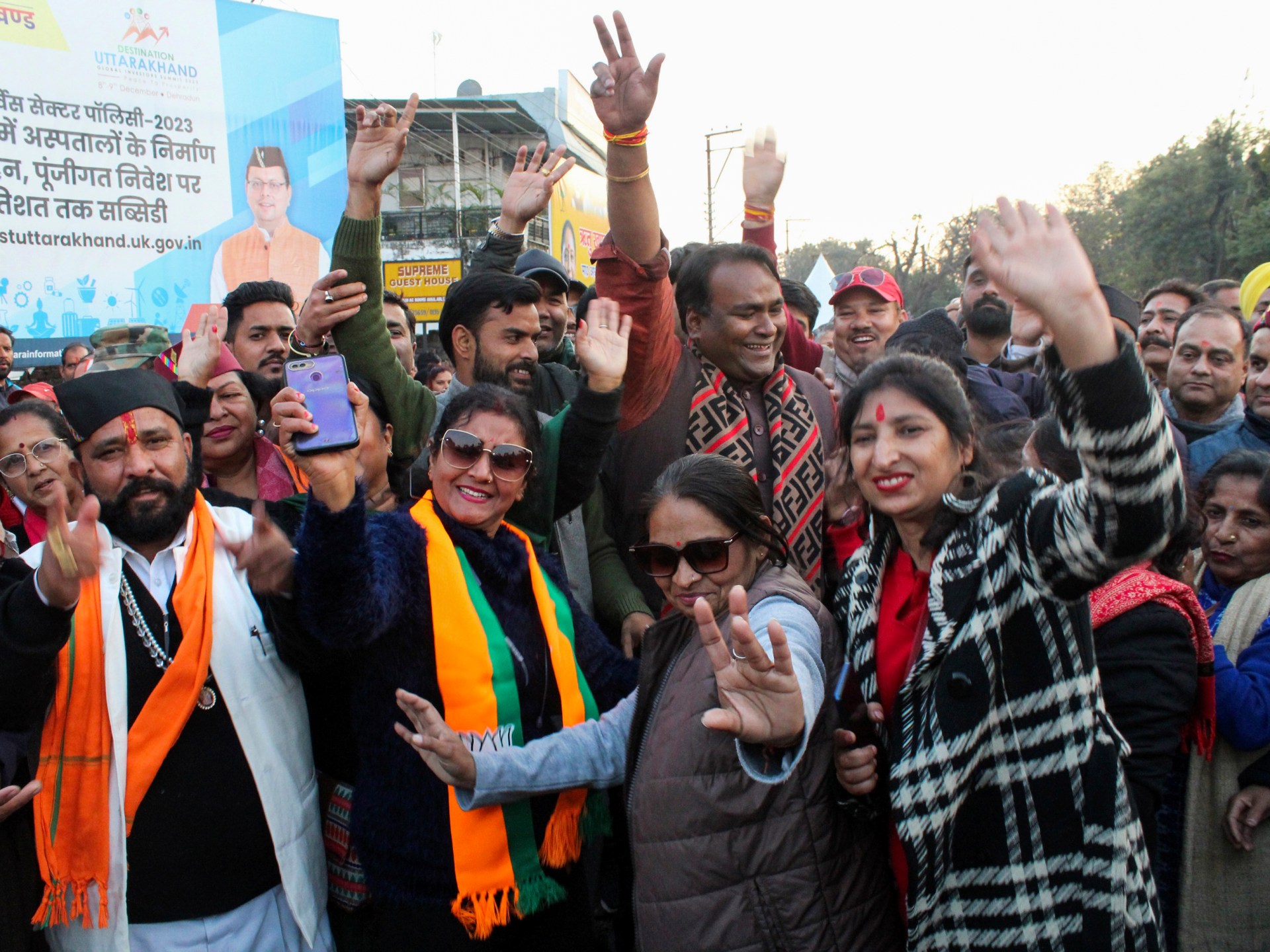New Delhi, India – The northern Indian state of Uttarakhand on Wednesday passed a law that enforces a uniform set of rules for civil relationships — including marriage, divorce and inheritance — across all religions and makes the registration of live-in relationships mandatory.
The legislation has sparked concerns among several critics over both its provisions and what some view as a larger political project in the works, driven by the Hindu majoritarian approach of Prime Minister Narendra Modi’s Bharatiya Janata Party, which also rules Uttarakhand.
Activists have raised an alarm against the provisions to punish live-in relationships that are not registered with the government. They say that it represents an intrusion by the state into the private lives of citizens.
Meanwhile, Muslim leaders have accused the BJP of trying to push through an agenda to impose what they say is effectively a “Hindu code” disguised as a uniform civil code on other religious groups, who are currently allowed their own rules on marriage, divorce, adoption and inheritance.
Pushkar Singh Dhami, the chief minister of Uttarakhand, has rejected the allegations that the new bill was against any particular religion. Yet, the timing of the new law — weeks before India votes in national elections between April and May — has triggered speculation over whether it would serve as a template for similar legislation in other states ruled by the BJP.
Hindu right-wing groups have campaigned for decades against the provision of separate personal laws for religious minorities. Gender rights campaigners, who have backed reforms in the personal laws, however, say a diverse nation like India should aim for equity rather than uniformity in laws.
Here is why the civil code has become so controversial:
What does the code mean for live-in couples?
Couples who fail to register their live-in status within one month will attract jail terms of up to three months or a maximum fine of 10,000 rupees ($120) or both. Any false statement while registering relationships can attract the same jail term, or a higher fine of as much as 25,000 rupees, or both.
The law will apply to those living in the Himalayan state as well as registered residents of the province if they are living elsewhere in India. If either of the couple is under the age of 21, the government, per the law, will inform their parents. When a couple ends their relationship, they must inform the government once again.
The law also allows a third party to submit a complaint against a couple that has not registered their relationship.
In theory, legally registering live-in relationships could help partners, especially women in a patriarchal society, to claim maintenance and for their children to be able to inherit property and other assets.
But the law undermines the very idea of live-in relationships as a means to avoid legally binding commitments, said critics. Mandatory registration also affects the privacy of thousands of couples. Live-in relationships, not uncommon in India’s cities, are not illegal but are considered a cultural taboo. The Indian Supreme Court has recognised privacy as a fundamental right.
And the potential for moral policing, harassment and government surveillance of private lives is particularly worrying for intercaste and interfaith couples, already often targeted by vigilante groups and even the administration, warned experts.
“Now the state is stepping deeper into the nosy neighbourhood uncle-aunty role, sanctioned by law,” said Nikita Sud, professor of the politics of development at the University of Oxford. Already, she pointed out, the intimate lives of Indians are often monitored by caste groups, families, parents, landlords and residents’ associations.
“All Indians should be asking what the state is doing in our bedrooms when it should be focusing on basics like food and agriculture, employment, healthcare, our polluted and under-resourced cities,’’ she told Al Jazeera.
This shocking provision also means that a man & a woman merely living together will have to prove that they’re NOT in a live-in relationship in case some vigilante or lunatic files a complaint.
BJP has now stepped into your bedrooms & can investigate you whenever it feels like. pic.twitter.com/OvN0kgVQRV
— Saket Gokhale (@SaketGokhale) February 6, 2024
What are the other key provisions of the bill?
The law makes 21 the marriageable age for men and 18 for women across all faiths. Muslim personal laws have not had a bar on the marriage of minor girls.
The provisions also prohibit polygamy by stipulating that a person entering into a marriage should not have a living spouse. Government data shows that bigamy rates among Indian Muslims are almost at par with the national average, and many tribal communities, especially in the country’s northeast, have dramatically higher rates of polygamy. Yet the BJP and its far-right allies have for decades tried to portray Indian Muslims as bigamous, and an end to the practice — which is allowed under Muslim personal law — as a way of helping Muslim women.
The Uttarakhand law also bans other practices followed by some sections of Muslims — such as Nikah halala, which stipulates that a husband cannot remarry his former wife unless she marries another man, consummates that marriage, and gets divorced again; and iddat, – the period a Muslim woman must observe after the death of her husband or a divorce, before marrying another man.
At the same time, it does not take on patriarchal provisions in Hindu civil law. Guardianship of a minor boy or unmarried girl goes to the father, and only after him, to the mother, under Hindu law, for instance.
“While technically a uniform civil code should have standardised provisions of marriage, divorce and succession for all, irrespective of their religious identity, it has selectively outlawed and criminalised personal laws and customary practices of religious minorities, especially Muslims,’’ said Namrata Mukherjee, senior resident fellow at the Vidhi Centre for Legal Policy.
“It disproportionately impacts Muslim personal law practices,’’ she told Al Jazeera.
In effect, the law forces Muslims to follow a different religion and culture, said Asaduddin Owaisi, member of parliament and chief of the All India Majlis-e-Ittehadul Muslimeen.
“In our religion, inheritance and marriage are part of religious practice,” he said on X, formerly Twitter.
What kind of uniformity, and whose code?
The provisions have exempted tribal communities from the code saying their customary rights are protected under the constitution.
Yet, that undermines the very idea of the law, said Sidharth Luthra, a senior advocate at the Supreme Court. “It is not a uniform code as certain communities are out of its purview,” he said.
Mukherjee said the decision to leave tribal communities out of the purview of the law appears to be a political call ahead of the 2024 elections by the BJP, which has been trying to woo these communities.
What is the present situation?
Currently, matters of marriage, divorce, adoption and inheritance are governed by multiple laws for different communities based on their religion and traditional practices.
While gender rights groups have long argued that some of them are regressive, India’s lawmakers have long grappled with the debate around uniformity versus equity — and whether the former is truly needed for the latter in a diverse, complex nation.
Successive governments since independence have stayed away from amending religious and customary laws even as they have overhauled many other outdated rules.
State governments can, however, enact common codes for their residents. Uttarakhand has become the first state to do so.
Why is the code so divisive?
The Rashtriya Swayamsevak Sangh (RSS), the ideological parent of the BJP, has been advocating for a uniform civil code for decades.
Supporters of this idea say the country’s progress towards social harmony and gender justice has been hampered in the absence of a uniform civil code. But critics point to the fact that efforts like Uttarakhand’s law selectively target practices of select minority groups, especially Muslims, and that a uniform set of civil rules would lead to an erosion of religious and cultural autonomy.
“The BJP has been consistently pushing a narrative by saying Muslim laws are discriminatory against women and uniform civil code will ensure gender justice,’’ said Mukherjee. “That is not the correct representation as Hindu laws are also discriminatory against women, and discrimination against women continues to prevail under the Uttarakhand civil code.’’
What lies ahead?
At the federal level, Modi’s administration has been weighing the political ramifications of the implementation of a common code for all citizens. In June 2023, the Law Commission sought public opinion for a uniform civil code. It is not just Muslims — Sikhs, Christians and tribal communities have all raised concerns over how a uniform set of rules could eat into their cultural practices.
But for the BJP, a uniform civil code is the third and final part of an unfinished agenda that has included the construction of a Ram temple in Ayodhya and the revocation of a constitutional provision that gave Indian-administered Kashmir semi-autonomous status. Kashmir’s status was scrapped in 2019, and Modi consecrated the temple in Ayodhya — built on the ruins of a 16th century mosque razed to the ground by a Hindu majoritarian mob in 1992 — in January.
Coming weeks before parliament elections, Uttarakhand’s uniform civil code adds to the BJP’s Hindu majoritarian quiver.
“This is going to help the BJP because they are going to convey through dog whistle politics that this is actually done to control Muslims,’’ said Nilanjan Mukhopadhyay, a New Delhi-based political analyst and a Modi biographer.
“This has been brought essentially to whipping up communal passion in the country.”
#Indian #state #punishing #livein #relationships #Religion



